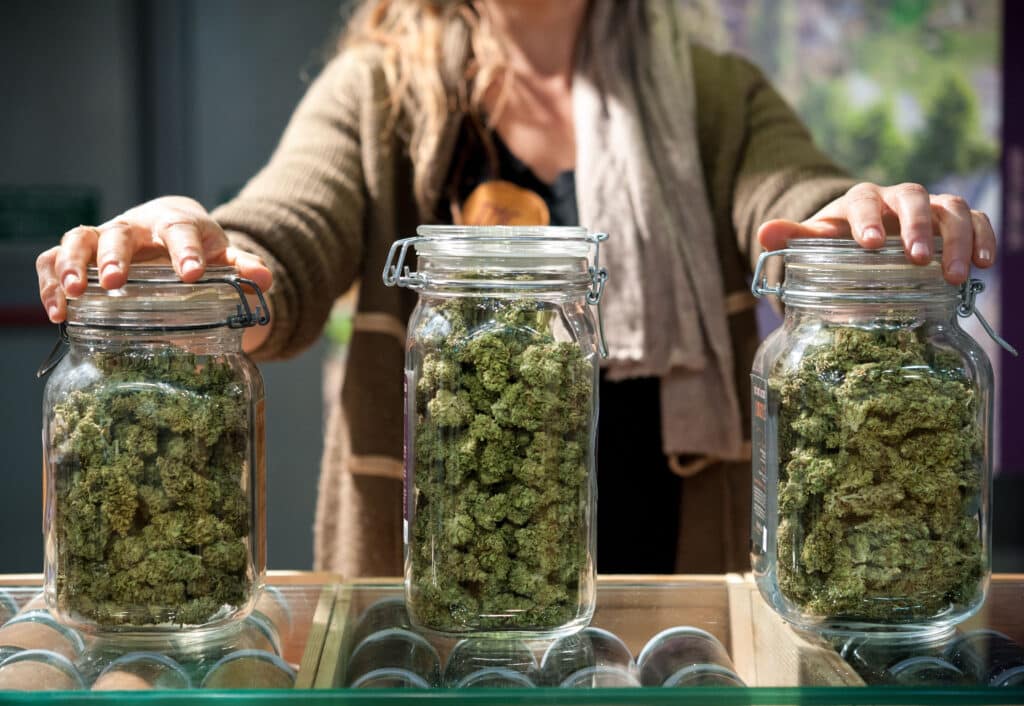Germany has sure been through the ringer. In a single year it went from charging forth with a full cannabis legalization, to going back on nearly everything it said; and scaling back all plans. It certainly isn’t what was initially hoped for, but here’s a look at Germany’s new cannabis plans, recently released as a draft bill.
Germany’s new cannabis plans
First and foremost, anytime you hear about a ‘draft law’ it means its not a real law, or at least, not yet. A draft is a rough copy. In the case of politics, its sort of like a hope. Some draft laws pass through houses of legislation quickly without edits; and some get torn apart, rewritten, or thrown out all together. So in terms of Germany’s new cannabis plans, they’re certainly not concrete, and represent what the country is trying for, but not what will definitely happen.
As per MJBizDaily, the new draft law also only covers part of what Germany wants to do with its scaled-back weed industry. The second half, not gone into here, involves a pilot program with very limited sales access. We’ll find out more about that later. In the first week of July, Germany released its tentative plans for the first part of the legalization; which include cultivation, both privately, and by groups. This is the current draft law.
Personal cultivation is a little easier. The real meat of the draft law has to do with what it calls ‘cultivation associations;’ not-for-profit groups that can grow cannabis for members, and then give it out to them. The members pay a fee to be in the club, and this fee covers their use; so there are no direct sales. This keeps it from being a standard sales market, as no specific product is paid for directly.

It’s essentially a government loophole, that gets around another government law. The EU won’t allow sales markets, these associations get around that. It’s the same loophole that Spain made famous with its cannabis social clubs. Unlike Spain’s setup, Germany’s associations will be for dissemination only, and will not be a place for social smoking.
The draft goes over certain points, some of which have already been discussed. All are related to personal cultivation and associations. Here are a few of the main ones:
- Each person can grow up to three plants
- Legal possession limit – 25 grams for adults
- Association limits for dissemination – 25 grams per a day, or 50 grams in a month
- Those under 21 cannot grow or access products with more than 10% THC
- Those under 21 cannot access more than 30 grams a month
- Neither cannabis, nor the associations that grow it, can be advertised or sponsored
What happens next?
A draft either passes into new law, or doesn’t. In order for this draft bill to pass, it has to get through a few steps. By mid-August its expected the current draft will go before the Cabinet. Assuming it gets past the cabinet, it moves onto both the parliament (Bundestag), as well as Bundesrat; a federal body which represents all 16 states in the country. It is up to the Bundestag to make the final decision in the end. Should that happen in a timely manner, its expected the legislation could go into effect by the end of this year.
This draft law is only one half of Germany’s new cannabis plans. Part of the upcoming process, is the introduction of legislation for the second half; the pilot program. As stated, this program will allow some amount of a limited sales market, although how limited is still not known. A pilot study is just an investigation into something on a small-scale, to determine how it could work on a bigger scale. So the idea is to investigate how a full-scale recreational legalization would work, by testing it on a smaller segment of the population.
This part is the part that overlaps more with EU policy. The part that must get a formal go-ahead. As per Germany, this part will be drafted in conjunction with the European Commission, as well as the other EU member states. Simply accepting that it can’t be a regular sales market is not enough. As recreational sales are involved, it requires a higher level of approval, from outside of Germany.

Nothing like this exists yet in the EU. Lets remember Switzerland and its pilot program are not a part of the EU, and not subject to EU laws when it comes to cannabis. As far as Luxembourg and Malta, the other two EU countries to pass legalization measures; neither attempted any kind of sales market, not even in the form of a pilot study. Malta’s legalization involves associations, but Luxembourg’s is just about cultivation.
Germany had such big plans
This issue of the EU and needing to follow its policy, is certainly adding some difficulty to cannabis reform measures that cross the line into recreational sales markets. The EU is okay with medical sales markets, and the majority of EU countries have them. Realistically, the EU as a federal body, does have its own concerns; like deals with other countries, and membership in international drug conventions. It’s the parent to its member-state children, and holds the ability to say ‘no.’
We saw this very distinctly with Germany. Germany decided over a year ago to legalize cannabis, but didn’t give details at the time as to how. By last fall, the word was out that the country was going to fully legalize cannabis, and open a recreational sales market. It was supposed to happen by spring of 2023.
It wasn’t until early 2023 that the whispers of problems became more like a roar. The previously ignored concept that the EU would have to approve, became a complete reality. While some politicians wanted to fight it, Health Minister Karl Lauterbach did not. In the end, when the announcement came after Easter, there was no sales market in the picture. Germany officials never explained fully what the EU said, but it was understood, that the governing body had not approved.
The same concept affected Luxembourg, although that country never tried like Germany did. It mentioned legalizing a few years ago, but only officially passed the measure last month. It had also originally planned a full scale sales market.
It ended up only passing a personal cultivation law; sans associations, and sans personal use amounts above a few grams; making it very much not a law that encourages anything outside of one’s house. While it could be that not the whole country was onboard with a sales market, its more likely that Luxembourg did this to evade issues with the EU.

Cannabis reform and the EU
The thing is, the EU can’t do this forever. Whatever reasons it has, eventually must be ironed out. This seems to be understood in that the EU recently held its first ever debates on cannabis. Called ‘Legalization of Personal Use of Cannabis: Exchange of Best Practices,’ it was chaired by Ireland’s Luke Flanagan, who had this to say:
“The importance of this gathering is not so much what we can get the European Commission to do, it’s more to see that they don’t get in the way and hinder this process. We don’t have competence over this area but it seems the Commission has the power to throw spanners in the spokes when countries try to do it.”
The co-chair to the meeting was the Czech Republic’s Mikuláš Peksa. The Czech Republic is looking to pass its own legalization measure, and has been extremely quiet about what it plans to do; probably because its still not sure how hard it can push. There are implications that the country wants to open a full sales market; but its unclear what exactly this means, or how the country will deal with the EU, if this is the intention. What is for sure, is that the Czech Republic knows its got an issue on its hands.
Legalization co-drafter Tomas Sadilek explained, “The European Commission is our biggest obstacle… it is always easier to regulate than deregulate and withdrawing cannabis from European legislation is very problematic.” He broke the problem down into three issues; general Schengen laws, EU drug trafficking laws from 2004, and international drug conventions.
Conclusion
Germany’s cannabis plans for personal cultivation and associations should pass through, although there could be an editing process. But this is a far cry from what the country originally wanted; and is representative of the main issue that stops recreational sales markets in the EU.
Welcome cannabis supporters! Cool that you’re here with us at Cannadelics.com, where we work daily to bring you the best in drugs reporting, with an emphasis on the cannabis and hallucinogen spaces. Check out our updates regularly to stay current; and get subscribed to the Cannadelics Weekly Newsletter, for awesome promos, along with the news.









